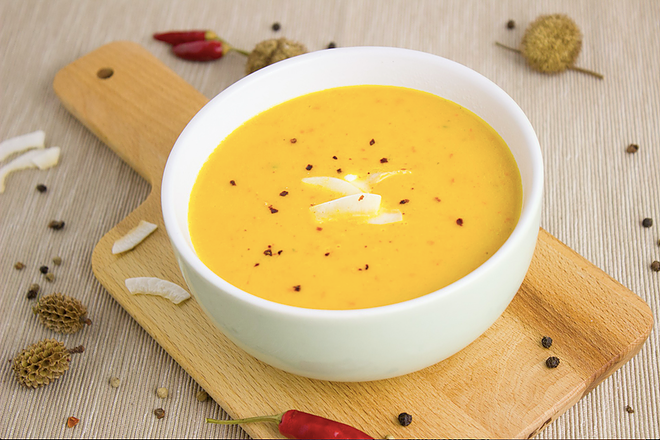Written by Aisling Geraghty // Nov 7th 2018
Each day that passes, you can feel the English November chill creeping in. Perhaps you have turned your heater on full power or started to light the fire in your living room each evening. If you are like most students, your house has become its own microclimate as you desperately try and keep the warmth inside, without escalating your utility bills. It never seems to be quite right. Sometimes, it’s too hot. And sometimes, you sit rigidly in your desk chair, covered in a thousand layers, all in a desperate effort to protect you from the arctic blizzard that is anywhere other than your bed. After a long day at work, you begin your journey home through the frosty darkness that is 5pm… dreaming of a warm bowl of hot pumpkin soup. Your mind conjures up a seasonal feast of roasted root vegetables and cinnamon spiced apple crumble. Doesn’t that sound delectable?
Eating sustainably doesn’t have to be a gloom-ridden affair of giving up all of your favourite foods. Nor does it have to be a competition of dietary labels. What you eat affects more than just your body and there are many ways in which we can eat cleaner and greener without feeling frustrated and unsatisfied. This entry discusses how you can spice up your meals without heating up the planet.

What’s in Season?
Get seasonal and embrace your own national produce. Winter is a time to be proud of what the UK can grow, so make it the centre of your meal choices. Let’s ravish in the abundant list below that presents some of the UK’s seasonal riches:


Go Local!
Check the air miles of your food to see if it has flown around the world to reach your plate. The good thing about eating seasonally is it harmonises with the positives of eating local produce. The more local you go, the lower the carbon footprint of your meals. Not only does your food travel shorter distances when you eat locally, but it also requires less packaging in the process of transporting it too.
Local sources!
- The Tree
I know it’s convenient to pop to Tesco and just throw your necessities into your basket, but if you aren’t in a rush, practice environmental strategy and look at the labels. If you are organised, you can make orders on “The Tree”, a marvellous open food network that operates around the UK, where you can buy local and seasonal produce. For St. Andrews, you can pick up orders from The Tree outside our union.
- Heart Space Whole foods or your local whole foods shop
why not purchase some veggies from Heart Space Whole foods on South Street? This is supporting our local community and isn’t too expensive for purchasing a few special items here and there. Don’t forget your matriculation card as they have a student discount.
- Edible Campus
It really is a shock to discover that many students in St. Andrews are missing out on free food. The wonderful “Transition University of St. Andrews” run several community gardens around town with volunteer sessions. If you have some free time and want to get in touch with nature, pop down and they will let you harvest some seasonal produce for free. This really is the most affordably green source of food our town has to offer!
- Start a mini herb garden
This one is simple, growing your own herbs is easy and will save you money and reduce the amount of packaging used. What’s more local than your own home?
Packaging!
With so much media coverage on plastic, this issue is unavoidable. It is so dreadfully important that we take time to seriously consider our contributions to the energy consuming mass use of packaging. Here are some tips for cutting back:
- Cook from scratch!
Try to to eat less processed foods which require excess energy-consuming preparation. Processed foods are usually more expensive than a home-cooked meal when you compare the portion sizes, and are rarely good for you. When it comes to your diet, go as naked as possible and remember that someone else is paying for the costs of your laziness. Cooking with raw ingredients allows us to be in charge of how processed our food truly is.
- At the supermarket!
It also goes without saying that bringing your own shopping bag is a must, so always carry one with you in case you decide to make an unexpected purchase. If you are buying fruit and veg, buy them loose if you can. If you have to package them, choose paper bags or biodegradable plastic. If you can buy packaged items in bulk, like rice or lentils, this will also reduce the amount of packaging you use.
- Recycle
If you consistently buy non-recyclable materials, it might be worth searching for alternatives or cutting down on these foods, which are most likely processed.
Try something new!
Food crazes often create sustainable challenges due to the distortion of values that often follow financial excellence, as we have seen in the cases of quinoa and avocados. The best way to avoid contributing to issues such as illegal deforestation or excess pollution is usually taking what you eat the most and eating a little less. Try to make your diet varied and perhaps try introducing vegetarian nights or dairy free days to make that extra difference.
if you follow the other 4 main goals listed above, you will be making a real impact on your health, the people around you and the whole world! So, take this winter as an opportunity for experiments in the kitchen and if you don’t like cooking too frequently, make bulk amounts and throw it in the freezer!
Helpful websites:
https://www.bbcgoodfood.com/recipes/category/seasonal
https://www.deliciousmagazine.co.uk/collections/october-seasonal-food/
https://www.vegsoc.org/sslpage.aspx?pid=525
http://www.eattheseasons.co.uk/
Photo credits: <a href=”https://visualhunt.com/author2/f8cd4deb”>Steve Rhodes</a> on <a href=”https://visualhunt.com/re2/c5eab592″>Visualhunt</a> / <a href=”http://creativecommons.org/licenses/by-nc-sa/2.0/”> CC BY-NC-SA</a>


